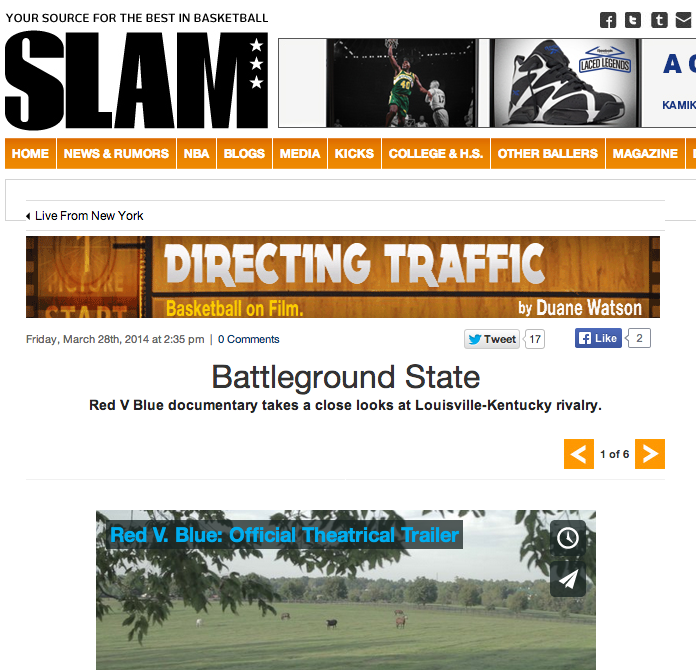Read Slam Magazine's Interview with Director Rory Owen Delaney about The Rivalry: Red V. Blue in Duane Watson's blog "Directing Traffic: Basketball on Film."
Battleground State: Red V. Blue documentary takes a close looks at Louisville-Kentucky rivalry.
By Duane Watson
Many will argue that North Carolina versus Duke is the greatest rivalry in college basketball, but in the Bluegrass State, nothing is as divisive as Louisville vs Kentucky. Only in Louisville, will you find two seniors coming to blows over their respective schools at a dialysis center. Yet despite their close proximity, both universities have only faced each other 46 times since 1913. The competition intensified with the annual Battle of the Bluegrass, which started in 1983, however, games take on a deeper meaning with the National Championship on the line. Both schools are in the Sweet 16 and face off in the Midwest Regional semi-final, No. 4 Louisville will face No. 8 UK with more than just state pride will be at stake.
Red V. Blue started filming as the Wildcats made their 2012 championship run, and the subsequent season as the Cardinals not to be outdone, won a national championship in 2013. Yet the documentary goes far back into the history of the state and it’s climate on a cultural level, providing a deep understanding of how this feud came to be, and why it still rages strong. While conflicts didn’t permit for the most coveted sit down Rick Pitino, the only person to have coached at both schools, there are a dearth of interviews, from former players, coaches, historians and most importantly their passionate fans.
SLAM spoke with Rory Owen Delaney, the director of Red V Blue about the film.
SLAM: Is this the biggest rivalry in basketball and why?
Rory Owen Delaney: Yeah, I think it really is the biggest rivalry in basketball. One of the big reasons is they only play once a year, as they’re not in the same conference. So you don’t get that Duke/North Carolina deal where they play twice and may play in the ACC tournament. They just have this one game and you got to get it right, and maybe you’ll get a meeting in the NCAA tournament. The other reason is there are no pro sports teams in Kentucky, so those two universities are the equivalent of pro teams. I think even Forbes Magazine has analyzed this and I believe both of those teams generate more revenue than most NBA teams. (Louisville has topped Forbes list for most valuable college basketball teams the last two seasons, but the program doesn’t generate more revenue than pro teams—Ed.). Lastly, I think this whole history of where they didn’t play for decades and where there was this urban rule, almost even a little bit of regional tension to it. Even though it’s not like it used to be, there still a little specter of it and fires people up a little bit more.
